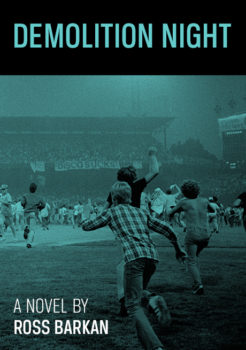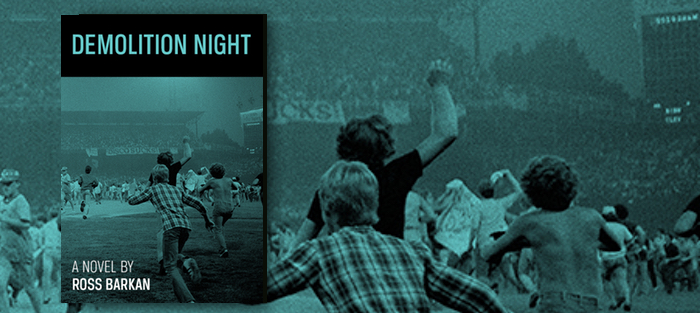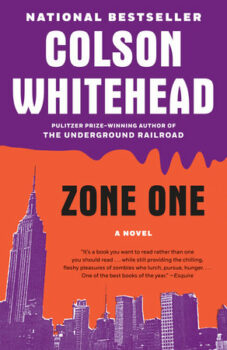Last year, Ross Barkan ran for a State Senate seat in New York. During a debate, he mentioned he was publishing a novel. I thought he, being a Brooklyn native, was kidding. Yet now that the election is over and he has lost his bid, he likes to joke that some say he ran to promote his novel, while others say he wrote the novel to promote his campaign. That novel, Demolition Night (Tough Poets Press), which was released in October, juxtaposes a dystopian future with a gritty portrait of the fin-de-siecle New York City of the late 1970s.
The narrative structure of Demolition Night yo-yos between these times and styles. In the 1979 storyline, an ex-cop vigilante character patrols Coney Island. Meet Archie “Vengeance” London, reminiscent of Rorschach from Alan Moore’s Watchmen. Archie is in love with Lolita Velez, whose brother Jojo—a member of the Candies, Barkan’s fictional version of the most notorious gang in New York City—is Archie’s nemesis. Throughout this storyline, Archie remembers conversations with a writer who goes by the name Truncheon. This name and the baroque density of characters and narrative threads suggest that Truncheon is perhaps a representation of Thomas Pynchon.
The stylistic comparison rings true, even if only with the free-associative trajectory of the novel. Archie’s and Lolita’s child, conceived in 1979 at the terminus of an uptown A train, becomes Octavio Velez, the future president who turns the country into a wage-slave state. Barkan has correctly identified an outcome of our society’s relationship with its corporations and made it literal. Using chips implanted in people’s wrists, the corporations of this dystopia have turned their employees into their property.
Pushing the critique of the corporate/surveillance state further, Gaggle—the company that has monopolized power in this future—not only tracks users but records and makes public their “quants,” or biostatistics, which determine a person’s place in society. Barkan accurately depicts the complexity of the technocratic age, since much of the information the Gaggle devices record—such as one’s consciousness, which individuals can post for other users to stream—is freely volunteered by users instead of extracted through an authoritarian Big Brother system. This is another likely outcome of today’s social media culture: what many of us mistakenly think is a “free” experience is more costly than we can understand; it’s our personal information that’s paying for it. In Demolition Night, quants and other data have made social and class mobility virtually nonexistent.
 These conceits situate Demolition Night in the realm of satire by way of the speculative fiction genre of dystopian science fiction. Through these exaggerations, the narrative explores the outcomes of contemporary phenomena such as how people have little to no control over which kind of information about themselves they would like to allow out into the world. Or of a society where corporations have unlimited power over citizens (and are, de jure, citizens themselves). Collectively, these amplifications and magnifications become warnings. They pose questions for the reader such as How did we get here? and How can we save ourselves from this future?
These conceits situate Demolition Night in the realm of satire by way of the speculative fiction genre of dystopian science fiction. Through these exaggerations, the narrative explores the outcomes of contemporary phenomena such as how people have little to no control over which kind of information about themselves they would like to allow out into the world. Or of a society where corporations have unlimited power over citizens (and are, de jure, citizens themselves). Collectively, these amplifications and magnifications become warnings. They pose questions for the reader such as How did we get here? and How can we save ourselves from this future?
In a sense, this future is already here. Facebook permitted Cambridge Analytica access to users’ data, and this significantly aided the victory of the Trump presidential campaign. In response to this breach (among other allegations of data impropriety), many users have retreated from Facebook. If only we had a time machine like the protagonist of Demolition Night: Sundra Glassgarden’s plan to solve the future is to travel back in time to the 1979 storyline of the novel in order to kill Octavio Velez’ pregnant mother, Lolita. Glassgarden believes that this will be the key to preventing the entire dystopia. An additional nuance resulting from the juxtaposition of these storylines has to do with how the New York City of 1979 was also a dystopia, in its way.
Unfortunately, the lessons of the reality on which the 1979 storyline in Demolition Night is based are what we have failed to learn, and which have come back to haunt us. It’s in this storyline, the gritty past of our country, and that of the world’s biggest and most exemplary city, where the key to understanding much of what went wrong in the present day now lies. In a sense, the 21st century of Demolition Night is an outdated future, since its political satire was conceived before late 2016. These days, everything before that year’s November feels like ancient history. In the Trump era, satire has become increasingly difficult, if not impossible. This seems to have much to do with Trump’s own obviousness. How can you satirize a politician who openly jokes about becoming a dictator? Barkan wrote Demolition Night in the Obama era, and his critique is of a future that required the manipulation of the public by a suave president such as the one Octavio Velez turns out to be. This was to be expected in the Obama era, and it rightly would have required the deep intelligence of a smart political satirist such as Barkan.
However, instead of that future, we’re in the Trump era. If we imagined a dystopia based on our current moment, it would likely be much stupider than expected. In many ways, dystopia in the Trump era isn’t a future at all; it’s a return to the same racist New York City of 1979 that’s depicted in Demolition Night. After all, it’s in the New York City of this period that the Justice Department, the same one now enforcing Trump’s policies, charged Trump Management, Inc. (Trump’s father’s company) with discrimination against people of color, people like Lolita Velez, the mother of Barkan’s dystopia-generating President Octavio Velez. Trump’s erstwhile racism is hardly a secret. He brought the policies of our government backwards, so that they now reflect values from the time of his childhood in Queens, which was a place where whites felt protected from people of color and immigrants.
The satire of Barkan’s dystopia, meanwhile, hinges on a neoliberal vision of the future, not that of Archie Bunker. This is especially true with regards to the identity of the future president, the one blamed for all the future’s problems in the novel. But Demolition Night still resonates. Trump, like Velez, has nonetheless assisted—or at least not stood in the way of—an erosion of our privacy and technology’s increasing ability to surveil our work and lives. However, this may be as much a result of our own reluctance to recognize how much the terms of service agreements of social media and technology platforms we use are a threat. We have mindlessly opted into these terms of service agreements, and as a result we are therefore complicit—just as the media must accept some responsibility for the result of the election after mindlessly giving Trump near-limitless coverage during his presidential campaign.
Barkan’s canny satire rightfully takes aim at our own complicity. And this is the strongest insight in the novel. The Gaggle devices don’t force users to stream their own consciousnesses to the public; users do so freely. Glassgarden’s father warns her of becoming a “zero,” another word for a nobody or a loser, only in the 21st century of Demolition Night, this has an even more significant economic meaning: if one’s not a zero, they’re a “premium,” another witty naming on Barkan’s part, since “premiums” are a sort of “middle-class,” a demographic we hear about but which some say no longer really exists. “Premiums” are wage slaves such as Glassgarden, in a position of some privilege but not elites. The elites in this dystopia are “Ents,” short for entrepreneurs. Here Velez’ and Trump’s worlds coincide neatly. Nonetheless, Velez represents a future in which class politics have become worse while identity politics alone have advanced. This is a dystopia based on criticisms of the Obama presidency. Again, it’s a political satire about neoliberalism, much subtler than the stubborn baseness of Trump’s regime. It’s unfortunate readers can’t read what an insightful, satirical mind such as Barkan’s could do with the Trump presidency, had the book been conceived in a different era.
Still, Demolition Night offers hope for a reader. The novel demonstrates how history is almost never the singular product of one personality, even one as captivating as Velez’ or Trump’s. Barkan, as a critic of many contemporary politicians and the corporations funding them, knows this. Likewise, once Trump falls, once he’s gone, and we begin the long process of undoing the damage he has done—or reconciling with the permanent damage—it will be important to recognize which kind of tendencies, which attitudes, which blindspots led to this era in which we’re living. It might take recognizing mistakes and sins that happened in a past as distant as 1979 in the history of our troubled country.






